Papers & speeches
I manage, occasionally, to find time to write articles and papers about some of the work that I do, and am also asked occasionally to give
speeches. Here are some of my more recent papers and speeches. Earlier papers and speeches are available in my archive
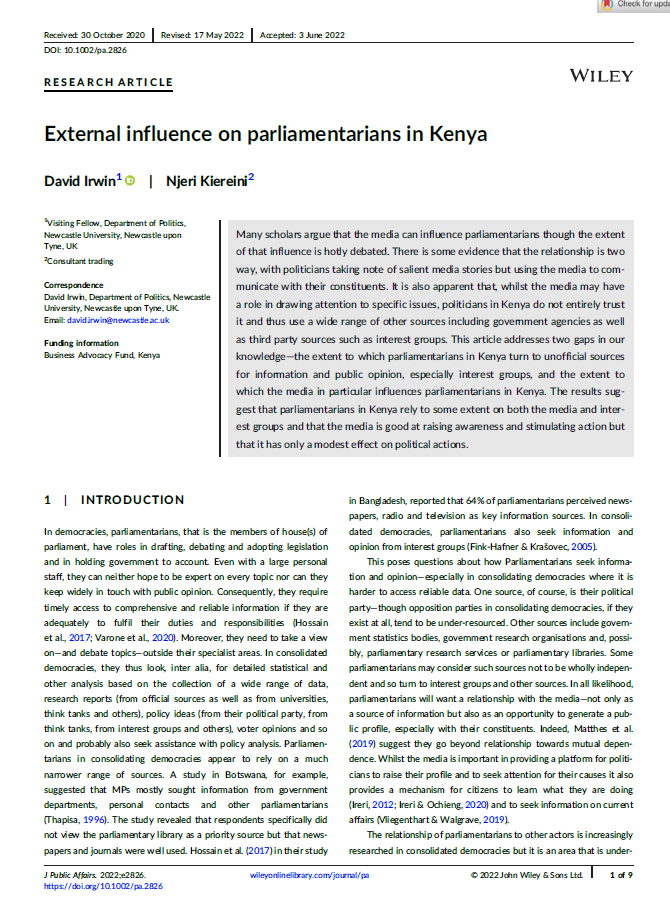
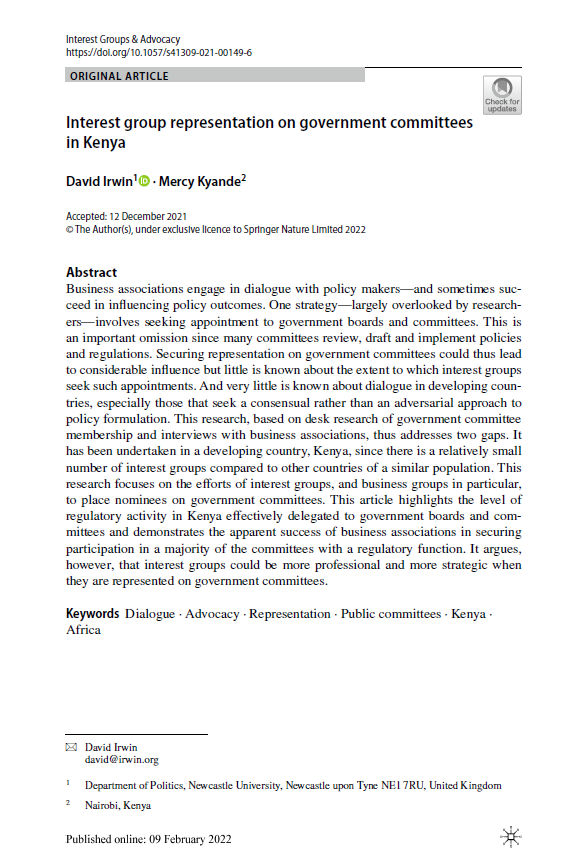
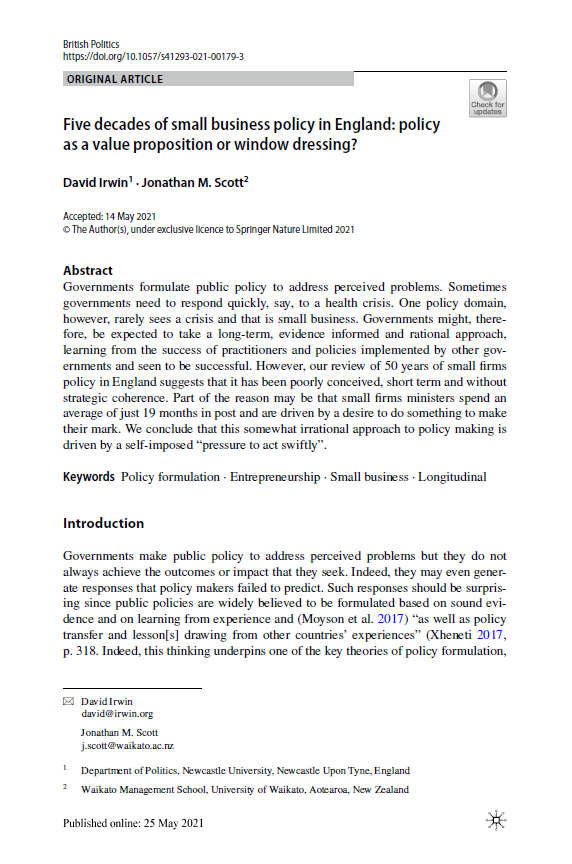

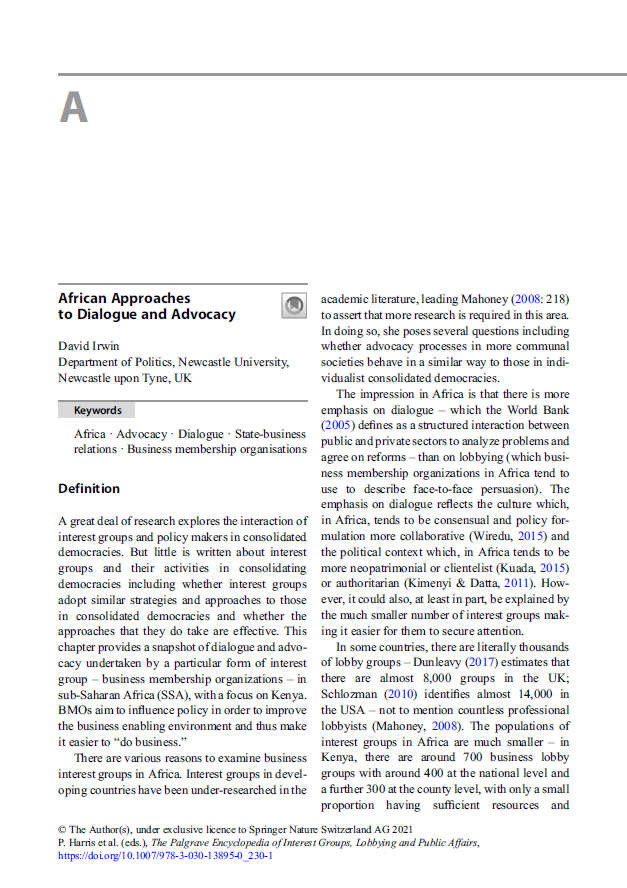
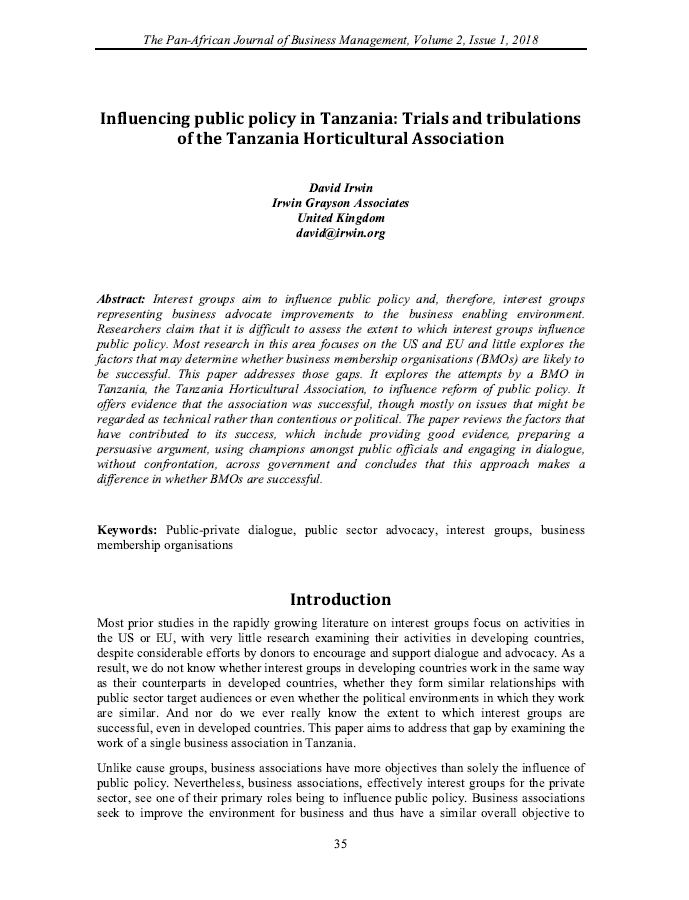
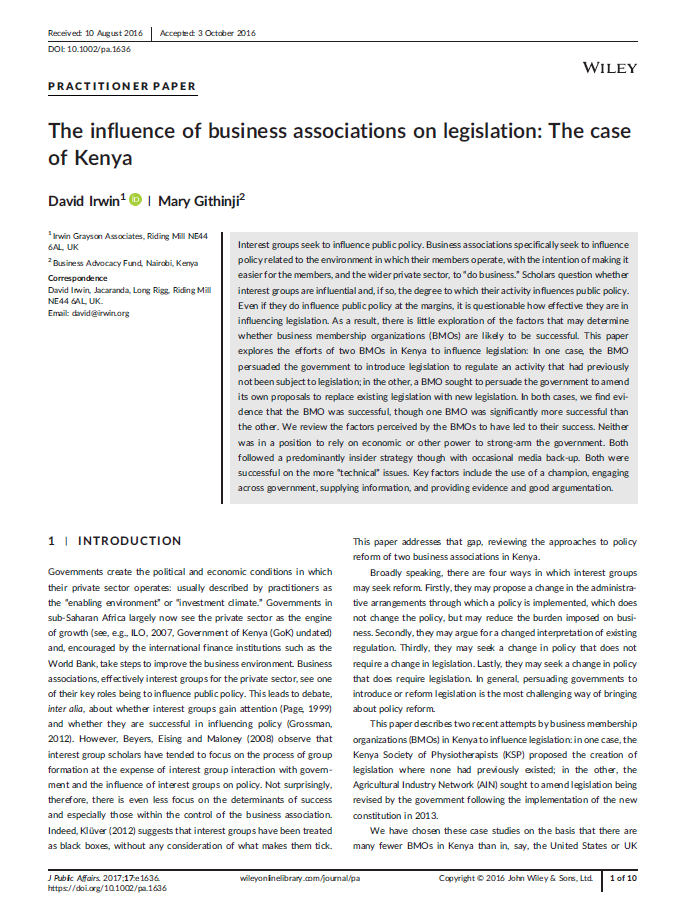
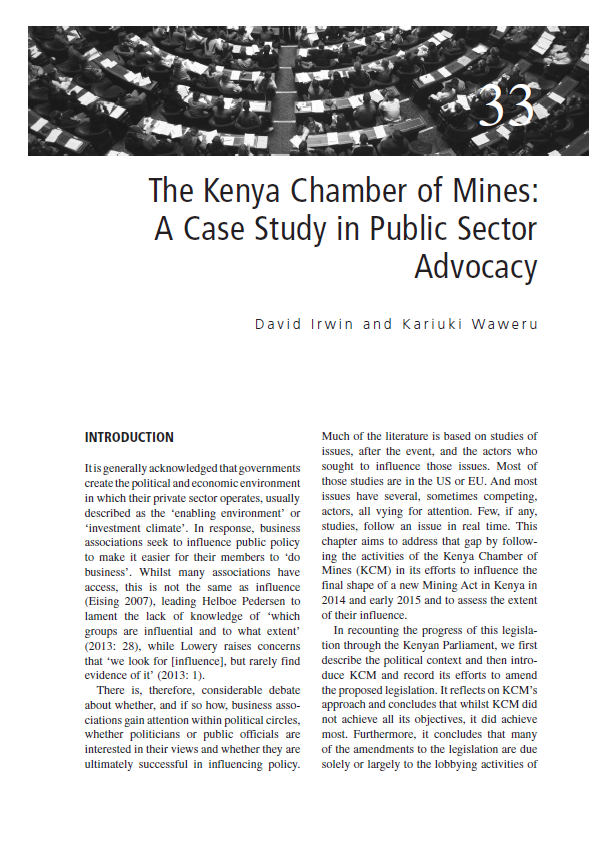
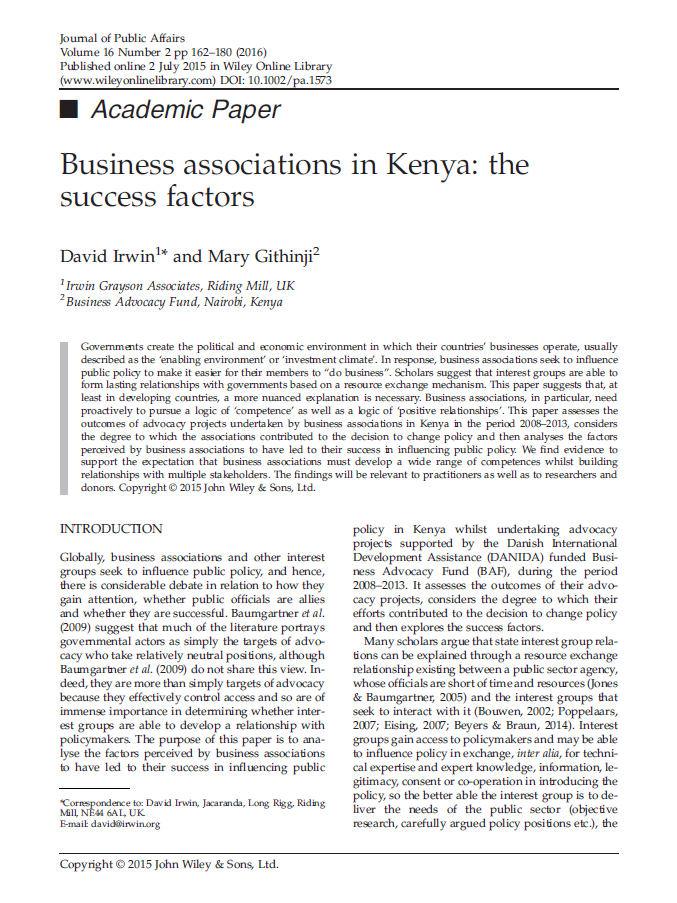
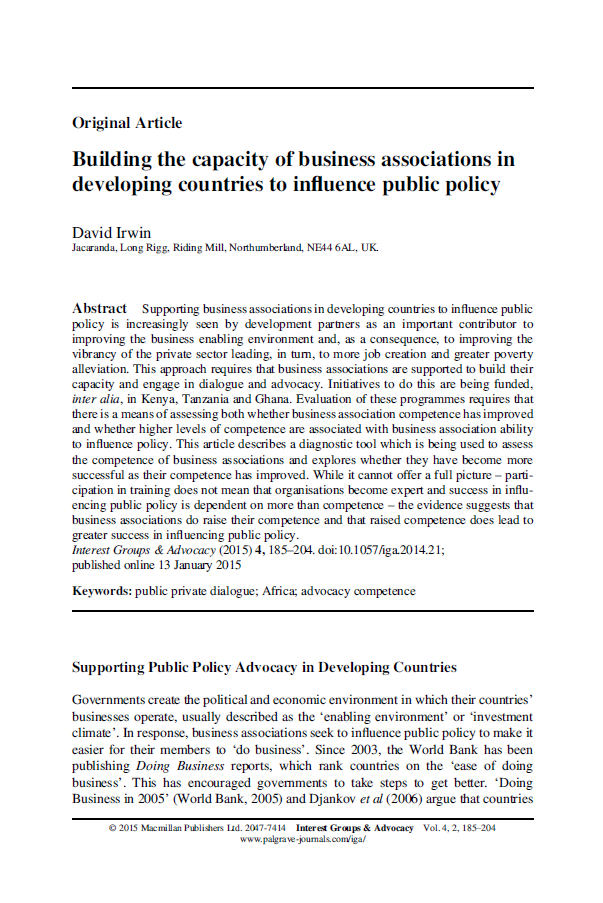

Irwin, D. & Kiereini (2022), External influence on parliamentarians in Kenya, Journal of Public Affairs
Many scholars argue that the media can influence parliamentarians though the extent of that influence is hotly debated. There is some evidence that the relationship is two way, with politicians taking note of salient media stories but using the media to communicate with their constituents. It is also apparent that, whilst the media may have a role in drawing attention to specific issues, politicians in Kenya do not entirely trust it and thus use a wide range of other sources including government agencies as well as third party sources such as interest groups. This article addresses two gaps in our knowledge―the extent to which parliamentarians in Kenya turn to unofficial sources for information and public opinion, especially interest groups, and the extent to which the media in particular influences parliamentarians in Kenya. The results suggest that parliamentarians in Kenya rely to some extent on both the media and interest groups and that the media is good at raising awareness and stimulating action but that it has only a modest effect on political actions.
The paper is available on the Journal of Public Affairs website.

Irwin, D. & Kyande, M (2022), Interest group representation on government committees in Kenya, Interest Groups & Advocacy
Business associations engage in dialogue with policy makers—and sometimes succeed in influencing policy outcomes. One strategy—largely overlooked by researchers—involves seeking appointment to government boards and committees. This is an important omission since many committees review, draft and implement policies and regulations. Securing representation on government committees could thus lead to considerable influence but little is known about the extent to which interest groups seek such appointments. And very little is known about dialogue in developing countries, especially those that seek a consensual rather than an adversarial approach to policy formulation. This research, based on desk research of government committee membership and interviews with business associations, thus addresses two gaps. It has been undertaken in a developing country, Kenya, since there is a relatively small number of interest groups compared to other countries of a similar population. This research focuses on the efforts of interest groups, and business groups in particular, to place nominees on government committees. This article highlights the level of regulatory activity in Kenya effectively delegated to government boards and committees and demonstrates the apparent success of business associations in securing participation in a majority of the committees with a regulatory function. It argues, however, that interest groups could be more professional and more strategic when they are represented on government committees.
The paper is available on the Interest Groups & Advocacy website.

Irwin, D. & Scott, J.M (2021), Five decades of small business policy in England: policy as a value proposition or window dressing? British Politics
Governments formulate public policy to address perceived problems. Sometimes governments need to respond quickly, say, to a health crisis. One policy domain, however, rarely sees a crisis and that is small business. Governments might, therefore, be expected to take a long-term, evidence informed and rational approach, learning from the success of practitioners and policies implemented by other governments and seen to be successful. However, our review of 50 years of small firms policy in England suggests that it has been poorly conceived, short term and without strategic coherence. Part of the reason may be that small firms ministers spend an average of just 19 months in post and are driven by a desire to do something to make their mark. We conclude that this somewhat irrational approach to policy making is driven by a self-imposed “pressure to act swiftly”.
The paper is available on the British Politics website.

Irwin, D. & Kiereini, N (2021), Media influence on public policy in Kenya, Journal of Modern African Studies
Many scholars argue that the media can influence policymakers – determining the policy agenda, framing issues, prioritising issues and, on occasion, setting the policy as well. It could be, however, that skilled policymakers exploit the media, so that the media in fact reflects the issues that policymakers want debated. This then poses an important question of whether the media does indeed influence the public policy process. The topic of media influence is widely studied in consolidated democracies but there has been limited research in consolidating democracies. This paper addresses both of these gaps – through exploring the extent to which themedia influences policymakers in Kenya, a country perceived to have a moderately free press and one in which a range of interest groups vie to influence government and thus with a media likely to carry a range of competing opinions.
The paper is available on the JMAS website.

Irwin, D (2021), African approaches to dialogue and advocacy, Palgrave Encyclopedia of interest groups, lobbying and public affairs
A great deal of research explores the interaction of interest groups and policy makers in consolidated democracies. But little is written about interest groups and their activities in consolidating democracies including whether interest groups adopt similar strategies and approaches to those in consolidated democracies and whether the approaches that they do take are effective. This chapter provides a snapshot of dialogue and advocacy undertaken by a particular form of interest group – business membership organizations – in sub-Saharan Africa (SSA), with a focus on Kenya. BMOs aim to influence policy in order to improve the business enabling environment and thus make it easier to “do business.”.
The chapter is available on the Palgrave Encyclopedia website.

Irwin, D (2018), Influencing public policy in Tanzania: Trials & tribulations of the Tanzania Horticultural Association,
Pan African Journal of Business Management
Interest groups aim to influence public policy and, therefore, interest groups representing business advocate improvements to the business enabling
environment. Researchers claim that it is difficult to assess the extent to which interest groups influence public policy. Most research in this area focuses on the US and
EU and little explores the factors that may determine whether business membership organisations (BMOs) are likely to be successful. This paper addresses those gaps. It
explores the attempts by a BMO in Tanzania, the Tanzania Horticultural Association, to influence reform of public policy. It offers evidence that the association was successful,
though mostly on issues that might be regarded as technical rather than contentious or political. The paper reviews the factors that have contributed to its success, which
include providing good evidence, preparing persuasive argument, using champions amongst public officials and engaging in dialogue, without confrontation, across government
and concludes that this approach makes a difference in whether BMOs are successful.
The paper is available here.

Irwin, D & Githinji, M (2017), The influence of business associations on legislation: the case of Kenya, Journal of Public Affairs, DOI 10.1002/pa.1636
Interest groups seek to influence public policy. Business associations specifically seek to influence policy related to the environment in which their members operate, with the
intention of making it easier for the members, and the wider private sector, to "do business". Scholars question whether interest groups are influential and, if so, the degree
to which their activity influences public policy. Even if they do influence public policy at the margins, it is questionable how effective they are in influencing legislation. As
a result, there is little exploration of the factors that may determine whether business membership organizations (BMOs) are likely to be successful. This paper explores the efforts
of two BMOs in Kenya to influence legislation: In one case, the BMO persuaded the government to introduce legislation to regulate an activity that had previously not been subject to
legislation; in the other, a BMO sought to persuade the government to amend its own proposals to replace existing legislation with new legislation. In both cases, we find evidence
that the BMO was successful, though one BMO was significantly more successful than the other. We review the factors perceived by the BMOs to have led to their success. Neither was
in a position to rely on economic or other power to strong-arm the government. Both followed a predominantly insider strategy though with occasional media back-up. Both were
successful on the more technical issues. Key factors include the use of a champion, engaging across government, supplying information, and providing evidence and good argumentation.
This paper is avaialble from Wiley Online Library

Irwin, D & Waweru, K (2017), The Kenya Chamber of Mines: a case study in public sector advocacy, in The SAGE Handbook of International Corporate & Public Affairs,
Eds: Phil Harris and Craig S. Fleisher Sage: London
This book chapter recounts the story of how the Kenya Chamber of Mines was able to persuade Parliament and government to accept more than 80 per cent of the proposals that they made to amend the draft text of the Mining Bill of 2014 as it wound its way through the parliamentary process to become the Mining Act of 2016. KCM was strategic in its approach; sat listening to parliamentary debates to seek insights; offered support to the parliamentary committee considering the bill; and was single-minded throughout the period from the bill being published to beconing law.
The handbook is available here; the chapter is available from me

Irwin & Githinji, Business associations in Kenya: the success factors, Journal of Public Affairs, 2016, 16: 2 pp 162-180, DOI: 10.1002/pa.1573
Governments create the political and economic environment in which their businesses operate, usually described as the
"enabling environment" or "investment climate". In response, business associations seek to influence public policy to make it easier for their members to
"do business". Scholars suggest that interest groups are able to form lasting relationships with governments based on a resource exchange mechanism. This
paper suggests that, at least in developing countries, a more nuanced explanation is necessary. Business associations, in particular, need proactively to
pursue a logic of "competence" as well as a logic of "positive relationships". This paper assesses the outcomes of advocacy projects undertaken by business
associations in Kenya in the period 2008 to 2013, considers the degree to which the associations contributed to the decision to change policy and then analyses
the factors perceived by business associations to have led to their success in influencing public policy. We find evidence to support the expectation that
business associations must develop a wide range of competences whilst building relationships with multiple stakeholders. The findings will be relevant to
practitioners as well as to researchers and donors.
This paper is available from
Wiley Online Library

Building the capacity of business associations in developing countries to influence public policy, Interest Groups & Advocacy, 2015,
185-204, doi:10.1057/iga.2014.21
Supporting business associations in developing countries to influence public policy is increasingly seen by development partners
as an important contributor to improving the business enabling environment and, as a consequence, to improving the vibrancy of the private sector
leading, in turn, to more job creation and greater poverty alleviation. This approach requires that business associations are supported to build their
capacity and engage in dialogue and advocacy. Initiatives to do this are being funded, inter alia, in Kenya, Tanzania and Ghana. Evaluation of these
programmes requires that there is a means of assessing both whether business association competence has improved and whether higher levels of competence
are associated with business association ability to influence policy. This paper describes a diagnostic tool which is being used to assess the competence
of business associations and explores whether they have become more successful as their competence has improved. Whilst it cannot offer a full picture
- participation in training does not mean that organisations become expert and success in influencing public policy is dependent on more than competence
- the evidence suggests that business associations do raise their competence and that raised competence does lead to greater success in influencing
public policy.
This paper is available from Interest
Groups & Advocacy.
Kenya's business networks: an inside circle? Sage Open, Jan-Mar 2015, 1-12
It has been suggested that business leaders - in so far as they are able to exert influence over public policy - do so
through their personal networks rather than acting through, or on behalf of, wider groups of business. The purpose of this paper is to explore
the extent to which personal networks in Kenya give business leaders easy access to policy makers. The concern is that a few business leaders
may be able to influence public policy, for good or ill, for public benefit or private gain, irrespective of the views of the majority of private
business or, at least, the majority of businesses in their sector. This paper takes a novel approach mapping relationships in order to explore the
extent to which business leaders are appointed to public bodies. It finds little evidence to support the thesis that an inner circle of business
leaders have undue influence.
This paper is open source.
Local Enterprise Agency loan funds and investment readiness in UK small firms Local Economy, Vol. 29 (1-2) pp.7 - 19, 2014,
with Jon Scott & Steve Pattinson
We considered (i) whether loan funds managed by Local Enterprise Agencies (LEAs) in England addressed the finance gap faced
by new and small firms that are unable to raise investment capital from other sources, and (ii) whether LEA loan funds offered value-for-money and
sustainability. Utilising realistic evaluation and data provided by LEAs, we found that funds had a high conversion rate of applications to loans,
presumably because most referrals came from advisers and so propositions unlikely to be supported had already been weeded out, and due to high
repayment rates. The level of demand suggested that knowledge of the availability of loans from these sources was still low, but that loans from
LEAs were genuinely additional for small firms that would not otherwise have been able to raise the required finance from other sources, indeed
in many cases leveraging commercially sourced funds. While LEA loan funds were becoming more efficient, they were not – and were unlikely to become
– wholly sustainable. The high conversion rate (and low default rate) suggested that the real need for prospective entrepreneurs is effective advice
and support to improve their ‘investment readiness’ and thus assist in unlocking the necessary financial support.
Go to paper on Sage Journals website
DOING BUSINESS: USING RATINGS TO DRIVE REFORM, Journal of International Development, Vol 26 (5) 658-667, 2014
The World Bank Doing Business results are widely used to promote reform—but they are based entirely on rankings that imply an equal spread between
consecutive ranks and effectively ignores shortcomings in the research methodology. Rankings can mislead countries that have made an effort to
reform can fall in the rankings even when they have improved if others have done even better. A scorecard based on ratings would provide a better
overall picture of which countries are doing well and less well and enable countries to set more realistic targets for reform because they could
then entirely focus on improving their rating.
Go to paper on Wiley website
Learning from business support in Africa,Management Research Review, Vol. 34 (2), pp.207 - 220, 2011
The purpose of this paper is to review approaches to providing support to entrepreneurs adopted by four business support
organisations, originally created with similar objectives, in Kenya, Uganda, Tanzania and Cameroon, to examine entrepreneurial heterogeneity in
Africa and the hypothesis that local solutions are required to support entrepreneurs effectively
Go to paper on MRR website
Quick links
The World Bank has also published a research report prepared by David: See Market study to understand job growth potential in SMEs in Nepal Working papersArchive of papers & articles
Recommended reading
